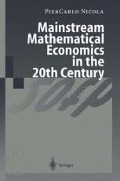Abstract
In the first part of this presentation of 20th century Mathematical Economics we saw, generally speaking, that “classical” mathematical analysis supplied the main tools1 to formulate and to study the various theories and models Since the Fifties, a marked change in the type to now presented. Since the Fifties, a marked change in the type of mathematical tools employed by economic theory becomes apparent. Tools essentially linked to differentiability are discarded in favour of more basic tools from set theory and general topology, together with a wide use of convex structures. This set of tools is frequently denominated “modern” analysis, to mark the change in emphasis which took place in mathematical economics during and after the second world war.2
Access this chapter
Tax calculation will be finalised at checkout
Purchases are for personal use only
Preview
Unable to display preview. Download preview PDF.
Author information
Authors and Affiliations
Rights and permissions
Copyright information
© 2000 Springer-Verlag Berlin Heidelberg
About this chapter
Cite this chapter
Nicola, P. (2000). From Classical to Modern Analysis. In: Mainstream Mathematical Economics in the 20th Century. Springer, Berlin, Heidelberg. https://doi.org/10.1007/978-3-662-04238-0_12
Download citation
DOI: https://doi.org/10.1007/978-3-662-04238-0_12
Publisher Name: Springer, Berlin, Heidelberg
Print ISBN: 978-3-642-08638-0
Online ISBN: 978-3-662-04238-0
eBook Packages: Springer Book Archive

